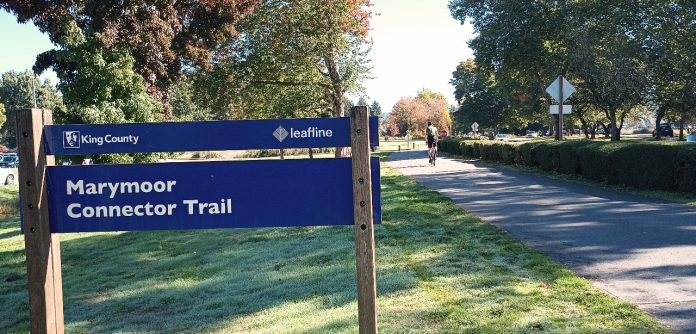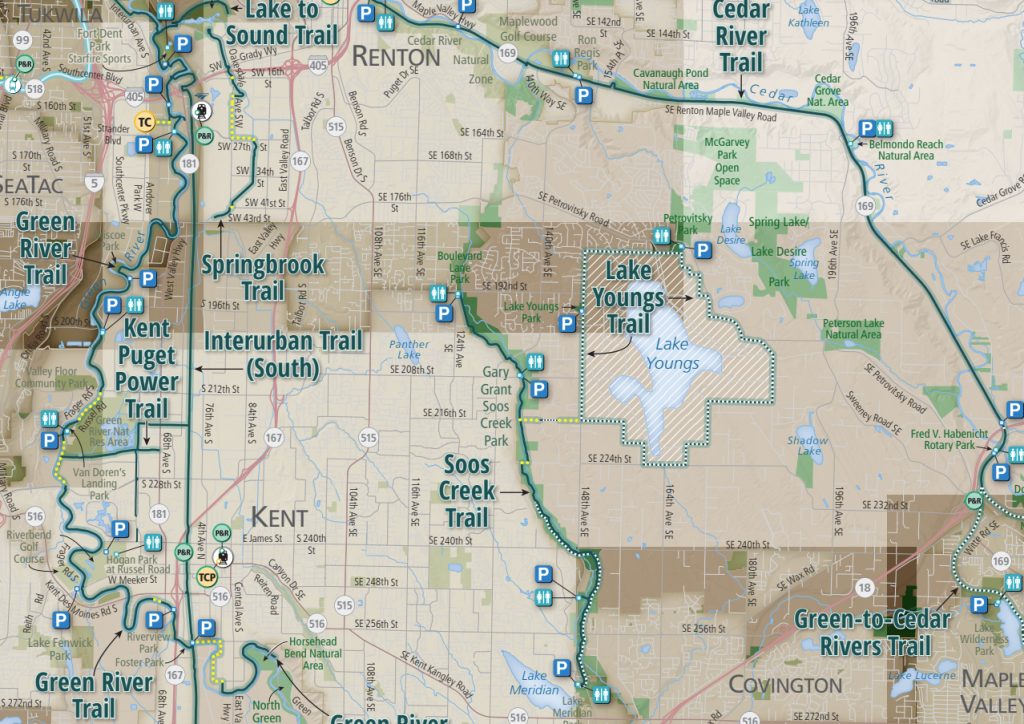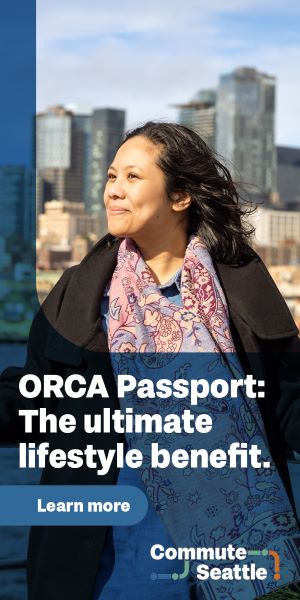
A bill approved Tuesday by the King County Council overhauling rules at county parks is set to finally allow legal use of most types of e-bikes on the county’s entire trail network and e-scooters on most county trails.
These changes are part of the first major overhaul to parks regulations in 40 years, and in many ways bring rules into alignment with how trails are already used. The fact that e-bikes and e-scooters are currently banned on the county’s extensive and growing network of multi-use trails isn’t widely known, but existing county law doesn’t currently have any carveout for these fast-growing modes and treats them the same as motor vehicles.
Due to a quirk in federal law, e-scooters will continue to be banned on two King County trails, because their construction was funded via federal highway dollars: the central segment of the East Lake Sammamish Trail, and a portion of the Lake to Sound Trail between Renton and Des Moines. But on the rest of the 175-mile county trail network, both e-scooters and e-bikes will be allowed, with the director of King County Parks and Recreation given the authority to restrict them in specific instances if a need arises. Segments of trails where e-scooters are not allowed are set to see new signage.
Only Class 1 and Class 2 e-bikes will be allowed on trails, a policy that aligns with state law and current policy in cities like Seattle. Class 3 e-bikes, which can go up to 28 miles per hour, would continue to be banned. But a 15 mph speed limit for all trail users will still apply regardless of mode.
The bill also gives the director of King County Parks the authority to expand the hours of operation of individual county trails, moving beyond the current framework where trails close to the public 30 minutes after sunset and reopen 30 minutes prior to sunrise. For a county trail network that is intended to exist as a real transportation option for people to be able to get around without a car, restricting operating hours is a severe limiting factor, but this issue has gone unaddressed for years.
“We have invested a lot of money in our regional trails, and we are rightly very proud of our growing regional trail system. The voters have supported it with their votes on parks levies, and we routinely talk about trails as being roads or highways, or even superhighways, for non-motorized means of transport,” King County Councilmember Claudia Balducci said Tuesday ahead of the vote.
Balducci’s district is home to the growing Eastrail corridor, and she noted that residents are increasingly relying on the trail network to get around.
“But for people who depend on this growing trail network, to get to work, school, or do trips with transit, this is not possible, especially when you think about the middle of winter when the sun rises around 8:00am and sets before 5,” Balducci said. “Our roads are open 24/7, and our trails are barely open eight hours during the winter.”
Two years ago, the City of Kirkland approved expanded hours of operation on a central segment of Eastrail that is city-operated — the Cross-Kirkland Corridor — from 5:00am to 11:00pm every day, with city leaders citing a desire to expand the trail’s potential as a transportation spine as they try and increase the amount of walking and biking trips made in Kirkland. In Seattle, the Burke-Gilman Trail is open until 11:30pm every day, but the moment that a trail user crosses the city limit to the north and the trail becomes is managed by King County, trail hours are much more limited.

Now those hours have the ability to change, but thanks to an amendment approved Tuesday and sponsored by Balducci, the county will need to go even further and prepare a feasibility study looking at how it may potentially expand operating hours on its trail network.
“We’re not asking parks to immediately expand the hours, but to come up with a process and steps we would take in order to prioritize regional trails for pilots, permanently expanded operating hours, or both,” Balducci explained. That report will be due next year, in advance of a formal proposal for the county’s next parks levy, which would potentially fund some of the improvements needed to expand trail hours, like lighting.
“It’s more complicated than it seems. I would love to just say they’re open all the time, but we need to work through a number of issues, including legal issues, safety issues, cost and investment that would be needed to make our trails really fully open,” Balducci said.
Many of the legal issues at play stem from what’s called recreational immunity, a provision of state law that holds that property owners can’t be held liable for injuries that occur when a recreational facility is used — immunity that doesn’t apply when a court finds that the facility was being used for transportation. Extending trail operating hours could potentially open up the county to additional liability if steps aren’t taken to ensure that trail users are protected.
Jurisdictions around Puget Sound continue to work to improve and expand their walking and biking networks. Updating the policies of the area’s biggest trail operator so that they make sense for today’s world is a big step forward for non-motorized travel across the region — and one that’s long overdue.
Ryan Packer has been writing for The Urbanist since 2015, and currently reports full-time as Contributing Editor. Their beats are transportation, land use, public space, traffic safety, and obscure community meetings. Packer has also reported for other regional outlets including BikePortland, Seattle Met, and PubliCola. They live in the Capitol Hill neighborhood of Seattle.





